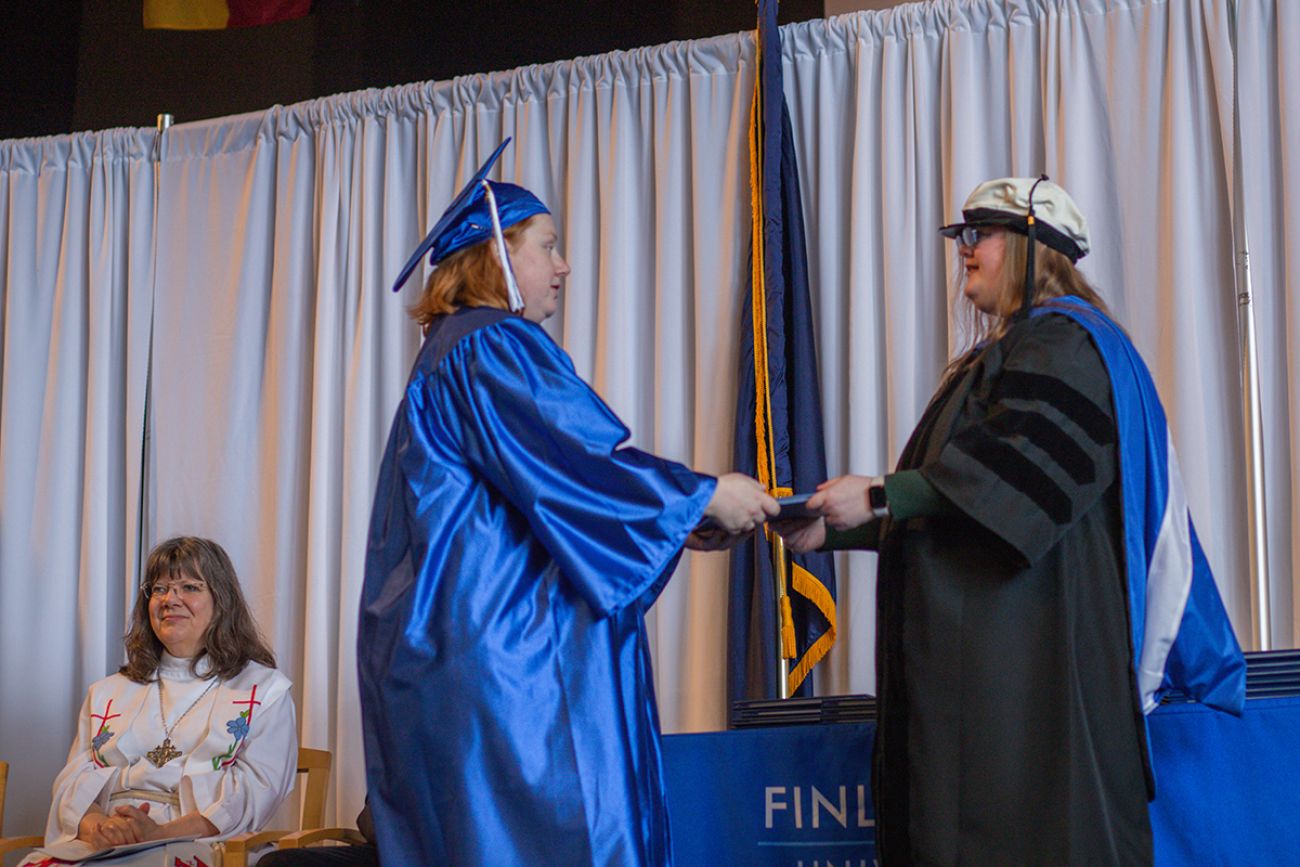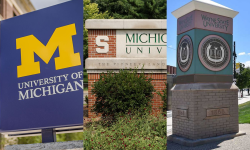Small Upper Peninsula school with Finnish roots toasts its last graduates

- The last senior class at Finlandia University graduated Sunday
- Fewer students are graduating from high schools and more families are deciding college is not worth the cost
- Finlandia has secured agreements with eight other schools to accept their students as transfers
On Sunday, the last senior class in more than a century of senior classes walked across a stage to receive their diplomas at Finlandia University. A private liberal arts campus in the Upper Peninsula, Finlandia is just the latest small U.S. college or university to close its doors.
“Even though this is the final commencement, this is not a funeral,” Stephen Nikander, great-grandson of the founder of what began in 1896 as Suomi College, said at the ceremony.
The school, in Hancock, is among more than 90 colleges and universities across the country that have closed, consolidated or announced plans to do so since 2016, most of them citing fewer students and rising costs.
Related:
- STEM degrees soar at Michigan colleges; business grads decline, records show
- Lake Superior State University president resigns
- Wayne State launches free tuition program to lower-income students
Finlandia’s Board of Trustees announced in March the university will not accept students for the upcoming academic year. At Sunday’s commencement, just under 100 graduates crossed the stage.
“The Board of Trustees made every effort possible to work with President (Timothy) Pinnow and his leadership team to avoid this conclusion,” according to the written statement. “We, as a board and leadership team, left no stone unturned in our attempts to move Finlandia forward toward a healthier future.”
The 126-year-old university had experienced financial challenges for more than a decade,Pinnow, the president, told Bridge.
“When you have those things that happen and you have increasing expenses then you have to find the money to keep going somewhere and many times that involves increasing your debt load,” he said.
Finlandia enrolled 628 full-time students in fall 2012; by 2020, that number had fallen to 478, a 24 percent decline.
Lower birth rates in the U.S. resulted in the shrinking pool of 18 year olds seeking a college education, a trend that heavily impacts small private institutions like Finlandia University.
Cardinal Stritch University in Wisconsin, Presentation College South Dakota, Cazenovia College in New York and Holy Names University in California all announced they will shut down after the current academic year.
Before closing, the university tried to introduce new programs to attract more students, including trying to partner with a local career and technical education program to offer college courses at the high school level.
Pinnow said the university was “almost ready to sign the dotted line” to offer online courses and expand the majors offered at Finlandia. It also explored partnering with Northern Michigan University to offer an education program for students who aspired to be teachers.
Years earlier, in 2014, the school unveiled a plan to introduce sports teams to attract more students, including cross country, Nordic skiing, golf, football, tennis, lacrosse, volleyball and wrestling. The following year the school invested $700,000 to build a field house for football.
“The reality is without the athletic students this place would’ve closed probably seven or eight years ago,” Pinnow said. “The athletes were an integral part of keeping this place open.” About 72 percent of the student body this past year were athletes, he added.
The sports programs helped keep the university afloat a few years, but didn't solve the problem of declining enrollment trends.
In addition to demographic declines, Pinnow alluded to recent surveys showing that a rising number of Americans don’t consider a college degree worth the cost.
“There has been a shift in our culture about the advantages of going to college,” Pinnow said. “College is expensive, too expensive and so a lot of people are saying, ‘It’s not worth it. I’m going to go into the trades, instead.’”
So Finlandia officials have spent much of the past year making sure that students who are not yet graduating have another campus to go to.
The university has secured so-called teach-out agreements with Adrian College, Bay College, Michigan Technological University, Northeast Wisconsin Technical College, Northern Michigan University, University of Dubuque, Waldorf University, and Wartburg College.
The agreements guarantee admission to current Finlandia students and that all of their credits will be accepted so that their expected graduation remains on schedule. The agreements also guarantee students transferring from Finlandia will pay the same or similar amount of tuition.
Other schools across the Midwest have also reached out. Alma College is offering Finlandia students a full tuition scholarship for up to three years. Albion College will guarantee admission to Finlandia students who have a minimum 2.5 GPA. Milwaukee School of Engineering will match out-of-pocket costs for Finlandia Students.
“In the end it really was a financial decision. We could barely get through the (spring) semester,” Pinnow said.
Finlandia University was founded by Finnish immigrants and is affiliated with the Evangelical Lutheran Church in America.
The school has a Finnish American Heritage Center, Finnish American Archive and the Finnish American Reporter, a monthly journal that publishes Finnish American news. While the university is closing, the Finlandia Foundation National, a group dedicated to preserving Finnish traditions in the U.S., is interested in purchasing all of those entities and possibly expanding them.
“Those things will continue to keep the Finnish heritage alive in Hancock even after the university closes,” Pinnow said.
Michigan Education Watch
Michigan Education Watch is made possible by generous financial support from:
Subscribe to Michigan Health Watch
See what new members are saying about why they donated to Bridge Michigan:
- “In order for this information to be accurate and unbiased it must be underwritten by its readers, not by special interests.” - Larry S.
- “Not many other media sources report on the topics Bridge does.” - Susan B.
- “Your journalism is outstanding and rare these days.” - Mark S.
If you want to ensure the future of nonpartisan, nonprofit Michigan journalism, please become a member today. You, too, will be asked why you donated and maybe we'll feature your quote next time!





